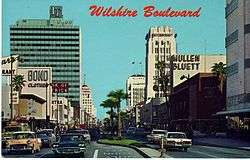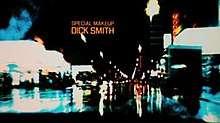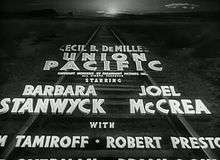Dan Perri
Dan Perri is a film and television title sequence designer. He has worked in film title design since the 1970s, and has been responsible for the main titles of a number of notable films including The Exorcist (1973), Taxi Driver (1976), Star Wars (1977), Raging Bull (1980), Airplane! (1980),[1] and Suspiria (2018).
Dan Perri | |
|---|---|
| Born | 1945 New York City |
| Nationality | American |
| Alma mater | Art Center School |
| Known for | Film title & logo design |
Notable work | The Exorcist (1973), Taxi Driver (1976), Star Wars (1977), Raging Bull (1980), Airplane! (1980), Suspiria (2018). |
| Website | www |
Early life

Dan Perri was born in New York in 1945. In 1949 his family moved to Los Angeles to be close to his father's parents, but his mother was unhappy there. Over the next few years Perri's family moved back and forth between LA and New York. Eventually his parents divorced and the young Dan stayed with his mother, who was an artist and encouraged his talent. At the age of twelve Perri set up a small sign painting business on Long Island, selling signage to local stores, markets bars and restaurants.[1]
At school, Perri's talents were fostered by his art teacher, Barbara Brooks, a former Madison Avenue advertising agency art director who had moved into teaching. She encouraged him to read books, design manuals, and various advertising industry publications such as Graphis publications and Communication Arts magazine. After leaving school in 1963, Perri served a short apprenticeship at Hixson & Jorgensen, an advertising agency on Wilshire Boulevard in LA. Around 1964 he went to study at the Art Center College of Design in Pasadena for a year and a half, before dropping out and going to a local college. Around this time, he started to design graphics for local businesses and album covers for small record companies.[1]
Career
Perri made contact with the film graphics designer Saul Bass and began to pester him for work at his studio on Sunset Boulevard. Eventually Perri found work with Bass through his illustrator, Art Goodman. During his service in the US Navy, Perri served on the USS Repose and designed an on-board newspaper, entitled The Repose Reprise.[1]
After serving in the navy, Perri went to work with Cinefx alongside Phill Norman, Wayne Fitzgerald Don Record, and a former school friend, Steve Smith. After a year, both Perri and Smith quit and went on to form their own independent design studio, Perri & Smith. The pair worked together from 1969 to 1973, mostly on small, low-budget television features, but their credits also included films such as Electra Glide in Blue and a number of Gene Corman's blaxploitation films. The designers were often exploited and clients sometimes failed to pay, and eventually the business folded.[1]
The Exorcist and Taxi Driver

Perri's big break came in 1973 when he was commissioned by Billy Friedkin to produced the main titles for The Exorcist, his first solo project. With a blockbuster film in his portfolio, Perri was now able to attract more work, and soon found himself working on high-profile titles. For Nashville (1975), Robert Altman commissioned a main title sequence and a logo to be used in marketing. Perri produced an unusual, kitschy sequence inspired by low-budget K-Tel Records television commercials, complete with a loud, brash voiceover by Johnny Grant.[1]
In 1976, Martin Scorsese brought Perri in to design the titles for Taxi Driver. Perri took second unit footage and colour-treated the film through a process of film copying and slit-scan, resulting in a highly stylised graphic sequence that evoked the "underbelly" of New York City through lurid colours, glowing neon signs distorted nocturnal images and deep black levels, accompanied by Bernard Herrmann's jazz soundtrack.[1][2]
Close Encounters
Early in the production of Close Encounters of the Third Kind (1977), Steven Spielberg hired Perri to design a logo for the film. With only a script to work from, Perri produced a logotype in Handel Gothic typeface. Spielberg was delighted with the result, and applied the logo to all production stationery and crew shirts. Unusually in filmmaking, Spielberg carried enough influence to maintain creative control over the film's branding, and asked Perri to design the entire advertising campaign for Close Encounters based on his logo.[3]
Star Wars

Possibly Perri's best-known title sequence project came about in 1976 when his friend James Nelson was working on post-production for a new space fantasy film, Star Wars. Nelson recommended Perri to director George Lucas, who invited Perri to Industrial Light & Magic, Lucasfilm's post-production operation at Van Nuys, California. Lucas briefed Perri to take inspiration from old 1930s cinema serials such as Flash Gordon and Buck Rogers that had inspired Lucas to write much of his Star Wars story.[4] After struggling to come up with a concept that Lucas liked, Perri eventually developed a concept for presenting a textual introduction based on the opening credits of the 1939 Cecil B. DeMille film, Union Pacific, in which the credits are shown distorted by a sharp perspective and rolling along a railroad track towards a distant vanishing point. Lucas approved of the idea and Perri produced sketches and prototype mechanical artwork, supported by storyboard artwork drawn by the production artist Alex Tavoularis. This gave birth to the now-familiar opening crawl sequence that appears in the Star Wars films.[5][1]

Perri also designed a logotype, consisting of block-capital letters filled with stars and skewed towards a vanishing point to follow the same perspective as the opening crawl. Lucas eventually rejected Perri's logo due to readability problems, turning instead to the graphic designer Suzy Rice, an art director at Seiniger Advertising, who designed the flat Star Wars logo that was inserted into the final cut of the film. While Perri's skewed logo did not appear on-screen, it was used widely on pre-release print advertising, and it featured prominently on film posters promoting the release of Star Wars on cinema billboards in 1977 (notably Tom Jung's Style ‘A’ poster, the Style ‘B’ poster by the Brothers Hildebrandt and Tom Chantrell's Style ‘C’ poster).[6][7][8]
Perri has stated that Lucas offered him a share of royalties from the film in lieu of his ordinary fee; Perri rejected the offer and has since regretted his choice.[1]
Later work
Perri worked for Scorsese again in 1980, designing a title sequence for Raging Bull. This featured a strong red logotype which emphasised the maniacal quality of the lead character, introducing a film that was shot in black and white. This caused technical problems when the film distributor spliced together colour film stock for the title and monochrome stock for the rest of the picture.[1]
Perri's subsequent credits have included The Fan (1981), The Equalizer (1985), The Player (1992). More recently, he designed the titles for Gangs of New York (2002) and The Beaver (2011).[1]
In 2018, Perri produced the logotype and main title sequence for Luca Guadagnino's film Suspiria (2018).
Selected filmography
| Year | Title |
|---|---|
| 2018 | |
| 2017 |
First House on the Hill |
| 2011 | |
| 2007 | |
| 2006 | |
| 2004 | |
| 2002 |
Gangs of New York |
| 1996 | |
| 1993 | |
| 1990 | |
| 1989-1990 | |
| 1990 | |
| 1988 |
Midnight Run |
| 1987 | |
| 1987 | |
| 1987 | |
| 1987 | |
| 1986 | |
| 1986 |
The Color of Money |
| 1986 |
Tough Guys |
| 1985-1986 | |
| 1986 | |
| 1986 |
9½ Weeks |
| 1985 | |
| 1984 |
A Nightmare on Elm Street |
| 1982 | |
| 1980 | |
| 1980 | |
| 1977 | |
| 1977 | |
| 1977 | |
| 1977 | |
| 1977 | |
| 1977 | |
| 1977 |
The Late Show |
| 1976 | |
| 1976 | |
| 1976 | |
| 1975 | |
| 1973 |
See also
References
- Perkins, Will. "Dan Perri: A Career Retrospective". Art of the Title. Archived from the original on 11 August 2017. Retrieved 11 August 2017.
- Mir, Shaun. "Taxi Driver". Art of the Title. Archived from the original on 12 August 2017. Retrieved 12 August 2017.
- Woodward, Adam. "Meet the designer behind your favourite movie title sequences". Little White Lies. Archived from the original on 12 August 2017. Retrieved 12 August 2017.
- Star Wars Episode III: Revenge of the Sith DVD commentary
- Perkins, Will (16 December 2015). "Star Wars". Art of the Title. Archived from the original on 2 April 2016. Retrieved 8 June 2016.
- Taylor, Chris (2014). "11. The First Reel". How Star Wars Conquered the Universe: The Past, Present, and Future of a Multibillion Dollar Franchise. Head of Zeus. ISBN 9781784970451. Retrieved 1 June 2016.CS1 maint: ref=harv (link)
- "Evolution of the Star Wars Poster". PhotoSecrets.com. Archived from the original on 28 July 2017. Retrieved 28 July 2017.
- Denham, Jess (3 August 2016). "The story behind that iconic opening Star Wars sequence". The Independent. Archived from the original on 12 August 2017. Retrieved 12 August 2017.
External links
| Wikimedia Commons has media related to Dan Perri. |
- Dan Perri on IMDb
- Dan Perri on Art of the Title
- Dan Perri's Title Design Blog
- Dan Perri: A Career Retrospective on Art of the Title
- Interview with Dan Perri: "Title Design: The Making of Movie Titles" (video). YouTube. Academy Awards. 25 July 2016. Retrieved 11 August 2017.